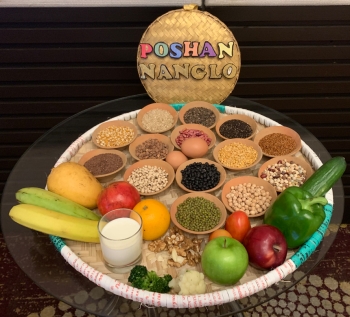Mothers of Young Children in Nepal Prefer Poshan Nanglo (Nutrition Tray) for Nutrition Social Behaviour Change Communication
Abstract
It is necessary to significantly accelerate the progress for optimal young child feeding practices in order to attain global nutrition goals and targets. Innovative and compelling communication approaches should be explored and tested to change social behaviours towards nutrition. A concept promoted in Nepal known as Poshan Nanglo (Nutrition Tray), is an interactive demonstration of locally available and nutritiously diverse foods.
Using qualitative methodology, this study adopts the phenomenology method to understand preferences and perceptions of Poshan Nanglo among mothers of young children. A total of 305 mothers of children aged 6 to 23 months were interviewed from September 2019 to January 2020. 90%preferred Poshan Nanglo over printed materials. Three themes emerged: a simple and an easy way to learn, the use of real foods help to understand better and it is a practical approach.
Thus mothers preferred and appreciated Poshan Nanglo to improve their understanding of good child feeding practices. These mothers also showed improvements in relating the importance of locally available nutritious foods for optimal dietary diversity. Approaching behaviour change should be informed and shaped by the beneficiaries’ interests and preferences. As a simple and sustainable approach in communicating about dietary diversity and good nutrition, Poshan Nanglo has wide relevance and potential.

Authors retain all copyrights. In making a submission to World Nutrition, they are certifying that all material is theirs except quotations, as indicated, and that they have obtained permission for any photos, tables, or graphics taken from other publications or websites.




